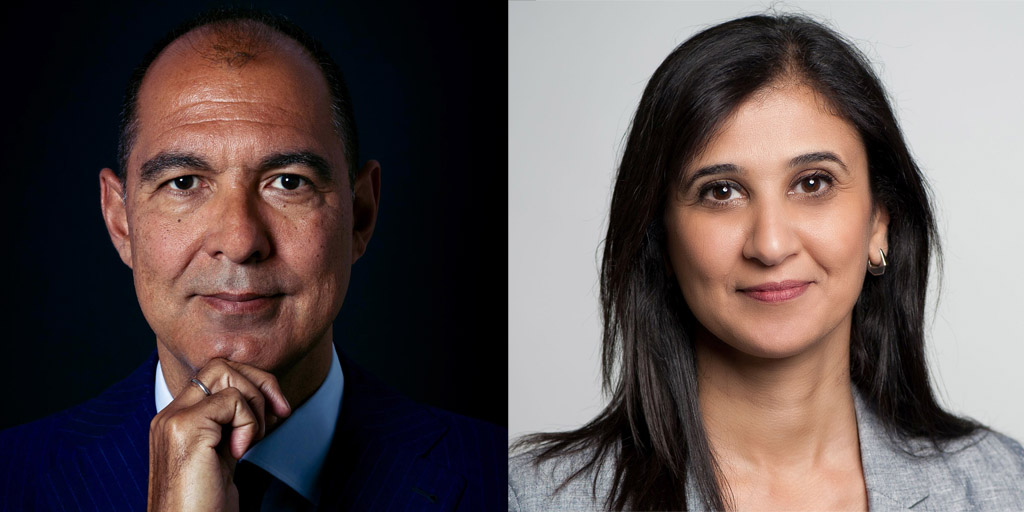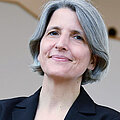
Digital Arabia Network (#DAN)

The Digital Arabia Network aims to be a lab for the digital future in the Arab world and to connect people and projects. No small task. The two founders and current joint chairmen Bassant Helmi and Professor Ayad Al-Ani met at a network meeting of the BWM Foundation Herbert Quandt as part of the Responsible Leaders Forum MENA in Casablanca in 2017.
Their joint discussion about the possibilities and risks of digitisation during a bus journey soon became an active network that has already become an important contact point for many people in the Arab world. Bassant Helmi and Prof. Dr. Dr. Ayad Al-Ani – and all Steering Committee members – support #DAN as volunteers. We asked them about their network and about digitisation in the Arab world.
Mrs. Helmi, Mr. Al-Ani, both of you have been living and working in Berlin for years and now you’ve founded the Digital Arabia Network (#DAN). What does the network offer?
Bassant Helmi: We are primarily interested in networking the bright minds in the Arab region who are engaged in digitisation in their societies and have set successful examples. The network pursues a holistic concept: We have different partners in Germany and the region – universities, companies, think-tanks and foundations. We also look at different spheres of digitisation – culture, education, politics and economy and health. We also have special topics, such as inclusion by tech, women and MINT – mathematics, information technology, natural sciences, technology. In the Arab world, there are a large number of successful actors in digitisation, but they are often left to their own devices and do not receive any support. We want to network these individuals, to link them together, in order to facilitate the exchange of experience and mutual support. We also want to create an interface for international companies and civil society organisations. Anyone who wants to know something about the status of digitisation, contact persons and projects should find what they are looking for on our platform.
Which countries does the network cover?
Helmi: In the first phase, we will focus on North Africa, from Morocco to Egypt, but representatives from Jordan and Lebanon are also included. Iraq and perhaps Palestine will join next year. These countries, in particular, are often not the focus of Western investors and supporters, which is why we wanted to start here first.
How did this idea to start such a network come about?
Helmi: In the first phase, we will focus on North Africa, from Morocco to Egypt, but representatives from Jordan and Lebanon are also included. Iraq and perhaps Palestine will join next year. These countries, in particular, are often not the focus of Western investors and supporters, which is why we wanted to start here first.
Ayad Al-Ani: Here in Germany, I work for large companies and administrations and support them in the digital transformation. It has become clear to me that digitisation in Europe will also influence the Arab world: on the one hand, technological changes in production processes, for example in the field of machine learning, will also be transferred to the Arab world and, on the other hand, global value chains will also change as a result. The electric car and the sewing robot, for example, will have a serious effect on the Arab supplier industry and the textile sector. Millions of jobs will be affected by these changes.
Why do you think digitisation is so important for the Arab region?
Al-Ani: Digitalisation is a very ambiguous concept. On the one hand, it means democratisation and access to resources that the state can no longer control. Access to news, opportunities for participation, but also learning content, have improved dramatically. On the other hand, however, digitisation paradoxically also means that monopolisation can occur because technologies such as blockchain and machine learning are initially expensive. In addition – as everywhere in the world – a battle for data sovereignty is starting. Do the Arab states adopt the Chinese state capitalist model or do civil societies create freedoms for themselves? The course is now being set for future societies.
The Arab societies will undoubtedly change as a result of digitisation. This is, of course, an issue that needs to be addressed very carefully, but it is impossible to believe that companies will digitise themselves but society will remain as it is. In this context, the 4.0 discussion, as it is taking place here in Germany, is very interesting for the Arab world. Germans see digitisation as an economic and also a social challenge. The Americans, on the other hand, see digitisation as a purely economic challenge. Without this being known here in Germany, many people in the Arab world look at the German Work 4.0 discussion and try to see whether there are parallels and transmission possibilities. Here, too, we want to make a contribution with our network.
And what happened after your first meeting in Tunisia?
Al-Ani: We discussed digitisation in the Arab world and our idea with many people from the region – including at a lecture at the German Science Centre in Cairo – and found that the actors in the Arab world are often isolated. They have often had to push through their ideas against resistance of a cultural, political or economic nature. And to do so they have often had to isolate themselves from their environment. This usually worked well to advance their idea but now is also the time to bring these different actors back together so that they can support each other. This is so important because they do not have the state support in the Arab world that one gets in Europe. They live in a much more restrictive environment. The Arab governments are just beginning to discover the subject for themselves. The impetus comes – as is usually the case with this topic – from private or civil society initiatives.
Helmi: The people in the region definitely need this networking. Mobility in the Arab world is very limited, visa formalities are often difficult. And the walls are getting higher and higher. Exchange via social media does not replace meeting from time to time – this is the only way to build trust and deepen understanding. Through such meetings we also want to show that despite all the obstacles, the digital actors in the Arab world are represented in all spheres – be it culture, economy, politics or e-participation – and that the actors need not shy away from comparison with their international colleagues. On the contrary: anyone who makes it here must be above average.
What role can the network play in this?
Helmi: We try to offer a regional meeting at least once a year. We also want to develop local cooperation opportunities in the individual countries. Of course, the platform should also become active in the field of social media. Together with international students of the Macromedia University here in Berlin, we are currently working on an interactive website that presents the individual actors of the network and their projects. It should also be a map of the digital Arab world, through which German companies, NGOs or foundations, for example, can learn with whom they can discuss the different facets of digitisation in the Arab world.
At first sight many of the effects of our platform seem to be small successes: we have linked one of our members via our project with the Association of German Women Entrepreneurs, she now has a German cooperation partner. Another network member designed a very large conference in Egypt in November and many of the speakers were from the network.
And we give mentoring and coaching. For example, I met a Jordanian journalist in Beirut who lives in Tunisia. She wants to train journalists in one of the disadvantaged regions of Tunisia on online media, in order to give these regions a voice in the capital. We are currently supporting her in writing the project concept.
Al-Ani: The situation in the individual countries is of course very different. What is a problem for one country has already been solved by another. In the best case scenario, the network enables an exchange between Arab countries to regain strength and courage – Morocco, for example, is a leader in the field of artificial intelligence. There were people in Lebanon who were leaders in cyber security. These experiences must be multiplied.
How are you financing yourself so far?
Al-Ani: So far, we have financed most of it ourselves. The Federal Foreign Office supported us for the kick-off event with 40 members of the closer core of the network in Beirut, which we were very pleased about. Otherwise, we do it with our own resources. Of course, we are also looking for partners for long-term cooperation – and, naturally, we must also be able to offer them something. That's always a bit of a chicken-egg problem with platforms. We're still at the beginning. But we have also achieved a few things: together with the Institute for Advanced Sustainability Studies at Potsdam we are developing a position paper on the state of digitisation in the Arab world, which we will also discuss with Deutsch Gesellschaft für Internationale Zusammenarbeit (GIZ) GmbH. We have already launched several events and our members themselves will become multipliers: for example, some will take part in the re:publica in Berlin and Thessaloniki, some are participating in Tunisian government advisory talks on digitisation, and some are discussing Jordanian education strategies.
Is re:publica – the largest conference on digitisation and society in Europe – a role model for you?
Helmi: We find the concept of re:publica extremely interesting because it is so thematically diverse, and we are already discussing with the organisers of re:publica and the Federal Foreign Office how the idea of such a format can be transferred to the Arab world. We are planning our own forum, the #DAN Forum, which is inspired by re:publica and similar events, but of course adapted for the Arab world and is independent. Networking with European platforms and formats is also planned.
When could such a conference be held for the first time?
Al-Ani: If everything goes according to plan: early 2019.

Dr. Annette Kleinbrod
All articles of Dr. Annette KleinbrodRelated Content
The reform of foundation law is coming
The bill to standardize foundation law will enter into force on 1 July 2023. The legislator has addressed important demands made by the Association of German Foundations and by academia, paving the way for improvements for small and large foundations alike.
Reflecting on 25 years of progress for gender equality – and how far there is to go
Twenty-five years ago, the World Conference on Women in Beijing adopted a Platform for Action that transformed national and international policies almost all over the world, recognizing that women’s rights are human rights. It impacted not millions, but billions of people.
“The SDGs are a powerful common language”
Benjamin Bellegy, Executive Director at the Worldwide Initiatives for Grantmaker Support (WINGS), on his new plans for the global SDG Philanthropy Platform (SDGPP).

